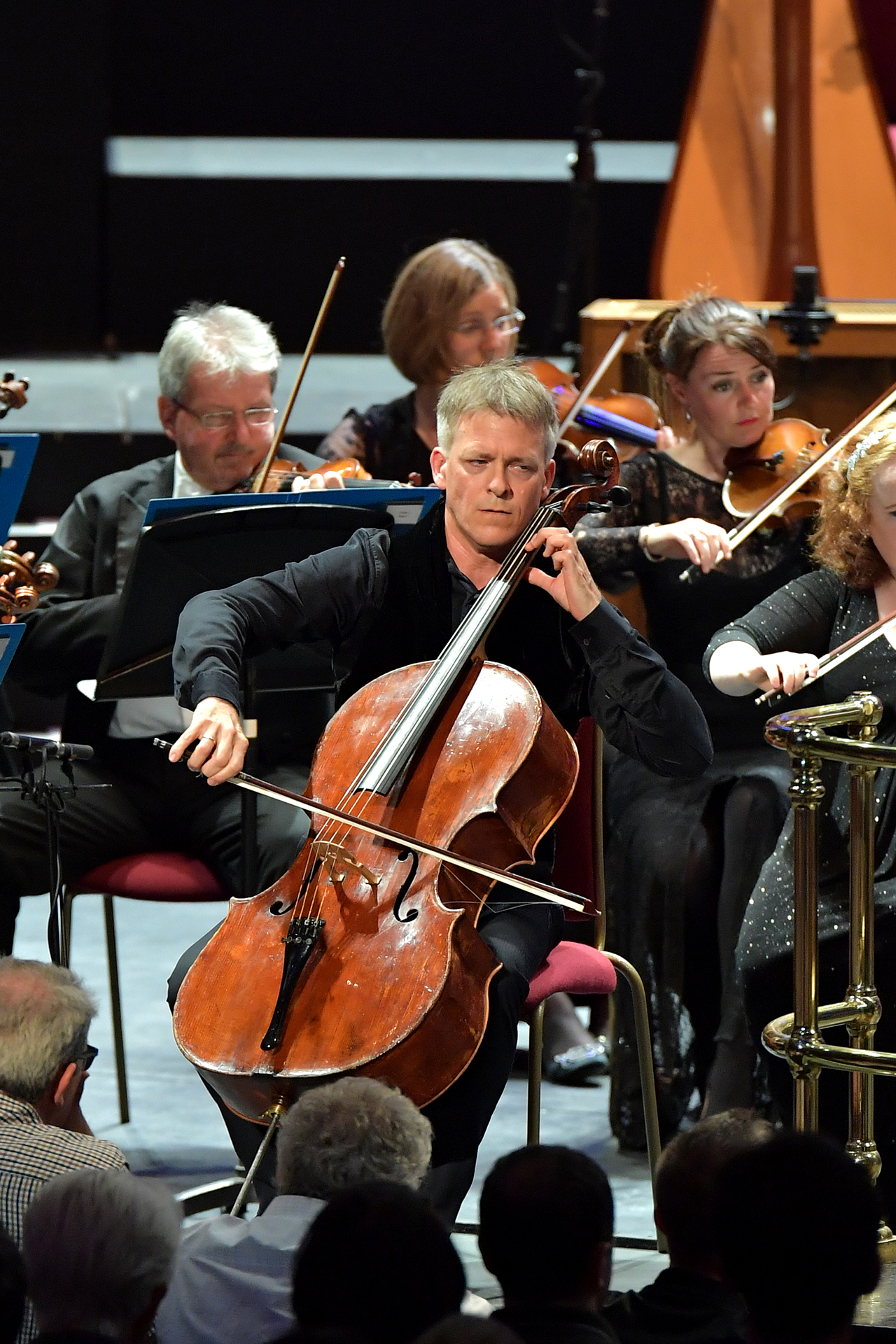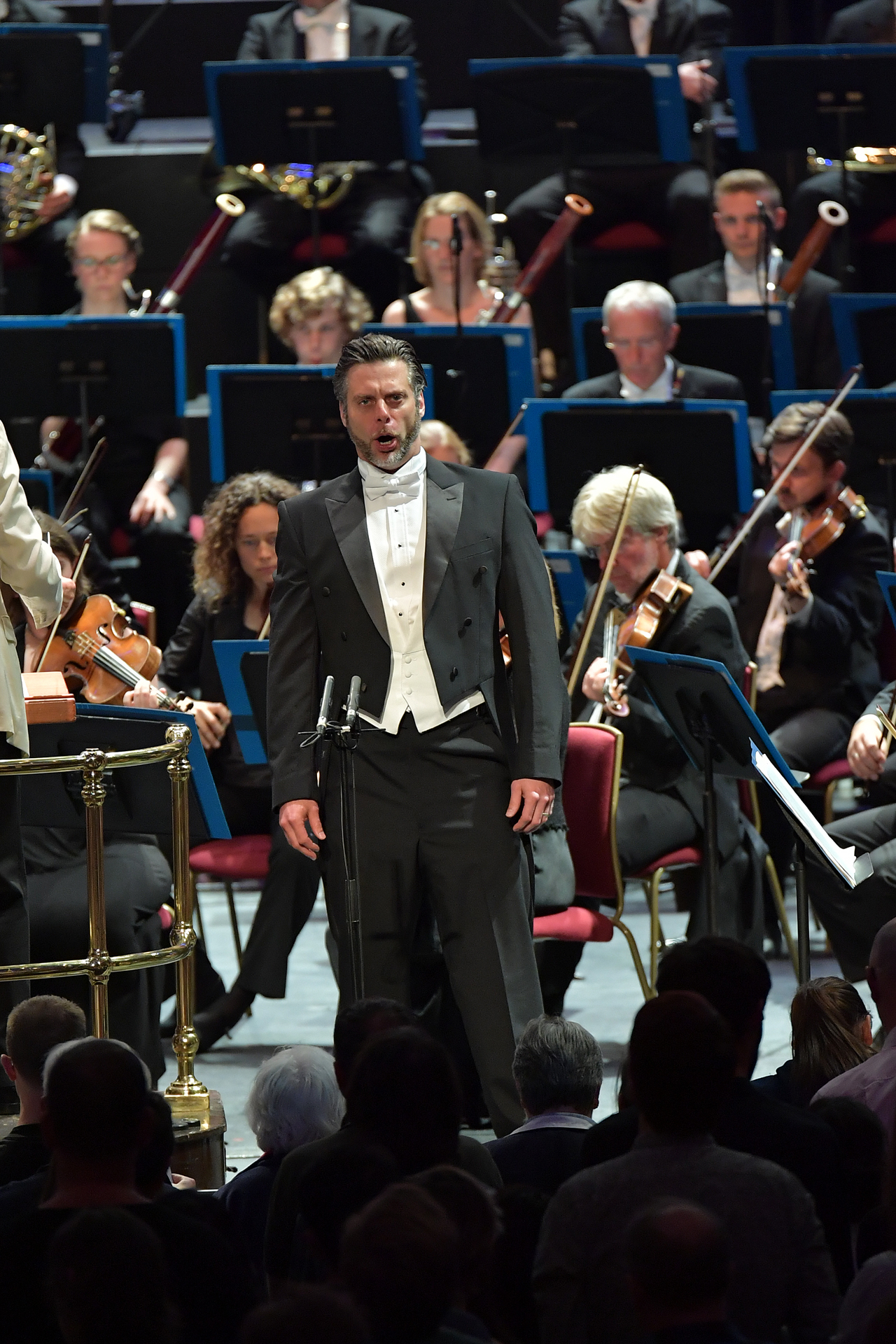Prom 25: Gerhardt, Komlósi, Relyea, RPO, Dutoit | reviews, news & interviews
Prom 25: Gerhardt, Komlósi, Relyea, RPO, Dutoit
Prom 25: Gerhardt, Komlósi, Relyea, RPO, Dutoit
The power of quiet in two middle-European masterpieces
"Let the song speak, I pray," exhorts the Bard in the Prologue to Duke Bluebeard’s Castle, "Listen in silence." This was a night for leaning in and listening closely, despite the large forces arrayed on stage for Dvořák’s Cello Concerto and Bartók’s opera.
It’s been said before, but the Royal Albert Hall is an unforgiving space for this year’s featured instrument, the cello. In the 2014 Proms, I recall American Alisa Weilerstein gave a memorably heated and hectic performance of the Dvořák with the Czech Philharmonic in which many nuances – and notes – were swallowed up. Alban Gerhardt chose the opposite approach: if he was to be heard, he needed time and space. Dutoit supplied those perhaps over-generously: horn and clarinet solos in the orchestral opening were languid, and there were moments when Gerhardt’s playing suggested more forward impetus than the RPO were willing to give.

His encore was a rare treat: the majesterial Prelude from Bach’s Suite No. 6 in D major. Paradoxically, in this repertoire, the hall smiles on the cello. He set out, once again, not to dazzle but draw his audience in, witnesses to the construction of Bach’s castle of airy arpeggios, here infinitely fragile, held in quivering tension by the sting of split timbres around pedal notes. Eventually, it takes wing into high treble melismas, showering blessings on a rapt full house.
From Bach's celestial castle to Duke Bluebeard's deathly dungeon was a leap, but that sense of intimacy was sustained. John Relyea (Duke) and Ildikó Komlósi (Judith) performed without music – or gesture – but an enthralling directness. Komlósi has Judith under her skin, and the gritty taste of Hungarian in her mouth. She sings, "I’ll unlock it, only I! I shall do it very gently…", and unlock the part she does, with a formidable range, from steely soprano to the darkest, softest mezzo.

Dutoit roused a lithe, mercurial performance from the RPO, expertly paced. Duke Bluebeard’s Castle needs no staging: everything is conjured by the orchestra. No visual coup de théâtre could ever match the moment Judith opens the fifth door to discover his kingdom. Those ecstatic, saturated, toppling chords, rumbling with organ and gilded by brass, are like nothing in all music: the impact here was spectacular. It takes skill to build tension again, but Dutoit and his singers achieved it. Komlósi’s final recognition of her fate was enough to chill the arena.
The future of Arts Journalism
You can stop theartsdesk.com closing!
We urgently need financing to survive. Our fundraising drive has thus far raised £49,000 but we need to reach £100,000 or we will be forced to close. Please contribute here: https://gofund.me/c3f6033d
And if you can forward this information to anyone who might assist, we’d be grateful.

Subscribe to theartsdesk.com
Thank you for continuing to read our work on theartsdesk.com. For unlimited access to every article in its entirety, including our archive of more than 15,000 pieces, we're asking for £5 per month or £40 per year. We feel it's a very good deal, and hope you do too.
To take a subscription now simply click here.
And if you're looking for that extra gift for a friend or family member, why not treat them to a theartsdesk.com gift subscription?
more
 'We are bowled over!' Thank you for your messages of love and support
Much-appreciated words of commendation from readers and the cultural community
'We are bowled over!' Thank you for your messages of love and support
Much-appreciated words of commendation from readers and the cultural community
 Scott, Irish Baroque Orchestra, Whelan, RIAM, Dublin review - towards a Mozart masterpiece
Characteristic joy and enlightenment from this team, but a valveless horn brings problems
Scott, Irish Baroque Orchestra, Whelan, RIAM, Dublin review - towards a Mozart masterpiece
Characteristic joy and enlightenment from this team, but a valveless horn brings problems
 Music Reissues Weekly: The Earlies - These Were The Earlies
Lancashire and Texas unite to fashion a 2004 landmark of modern psychedelia
Music Reissues Weekly: The Earlies - These Were The Earlies
Lancashire and Texas unite to fashion a 2004 landmark of modern psychedelia
 Hamlet, National Theatre review - turning tragedy to comedy is no joke
Hiran Abeyeskera’s childlike prince falls flat in a mixed production
Hamlet, National Theatre review - turning tragedy to comedy is no joke
Hiran Abeyeskera’s childlike prince falls flat in a mixed production
 Like Water for Chocolate, Royal Ballet review - splendid dancing and sets, but there's too much plot
Christopher Wheeldon's version looks great but is too muddling to connect with fully
Like Water for Chocolate, Royal Ballet review - splendid dancing and sets, but there's too much plot
Christopher Wheeldon's version looks great but is too muddling to connect with fully
 Lee Miller, Tate Britain review - an extraordinary career that remains an enigma
Fashion photographer, artist or war reporter; will the real Lee Miller please step forward?
Lee Miller, Tate Britain review - an extraordinary career that remains an enigma
Fashion photographer, artist or war reporter; will the real Lee Miller please step forward?
 Rohtko, Barbican review - postmodern meditation on fake and authentic art is less than the sum of its parts
Łukasz Twarkowski's production dazzles without illuminating
Rohtko, Barbican review - postmodern meditation on fake and authentic art is less than the sum of its parts
Łukasz Twarkowski's production dazzles without illuminating
 Lee, Park Theatre review - Lee Krasner looks back on her life as an artist
Informative and interesting, the play's format limits its potential
Lee, Park Theatre review - Lee Krasner looks back on her life as an artist
Informative and interesting, the play's format limits its potential
 Ariodante, Opéra Garnier, Paris review - a blast of Baroque beauty
A near-perfect night at the opera
Ariodante, Opéra Garnier, Paris review - a blast of Baroque beauty
A near-perfect night at the opera
 Classical CDs: Voice flutes, flugelhorns and froth
Baroque sonatas, English orchestral music and an emotionally-charged vocal recital
Classical CDs: Voice flutes, flugelhorns and froth
Baroque sonatas, English orchestral music and an emotionally-charged vocal recital
 Odd times and clunking lines in 'The Life of a Showgirl' for Taylor Swift
A record this weird should be more interesting, surely
Odd times and clunking lines in 'The Life of a Showgirl' for Taylor Swift
A record this weird should be more interesting, surely

Add comment